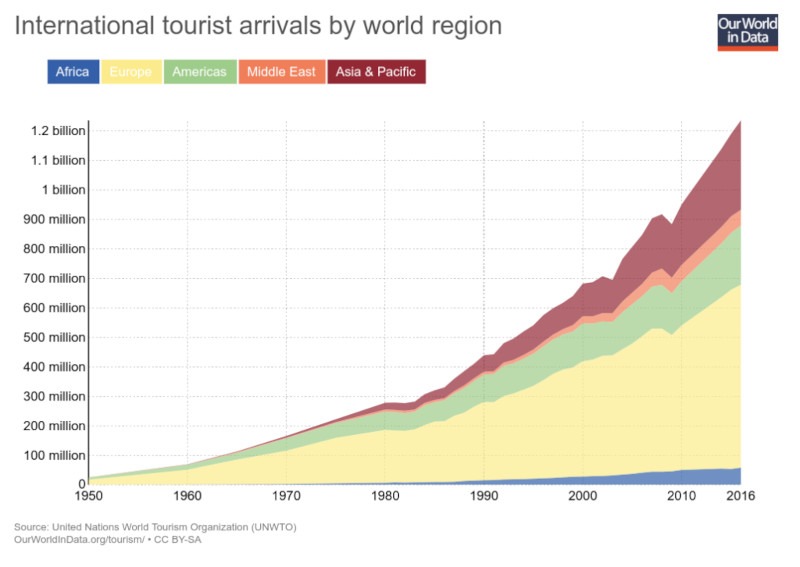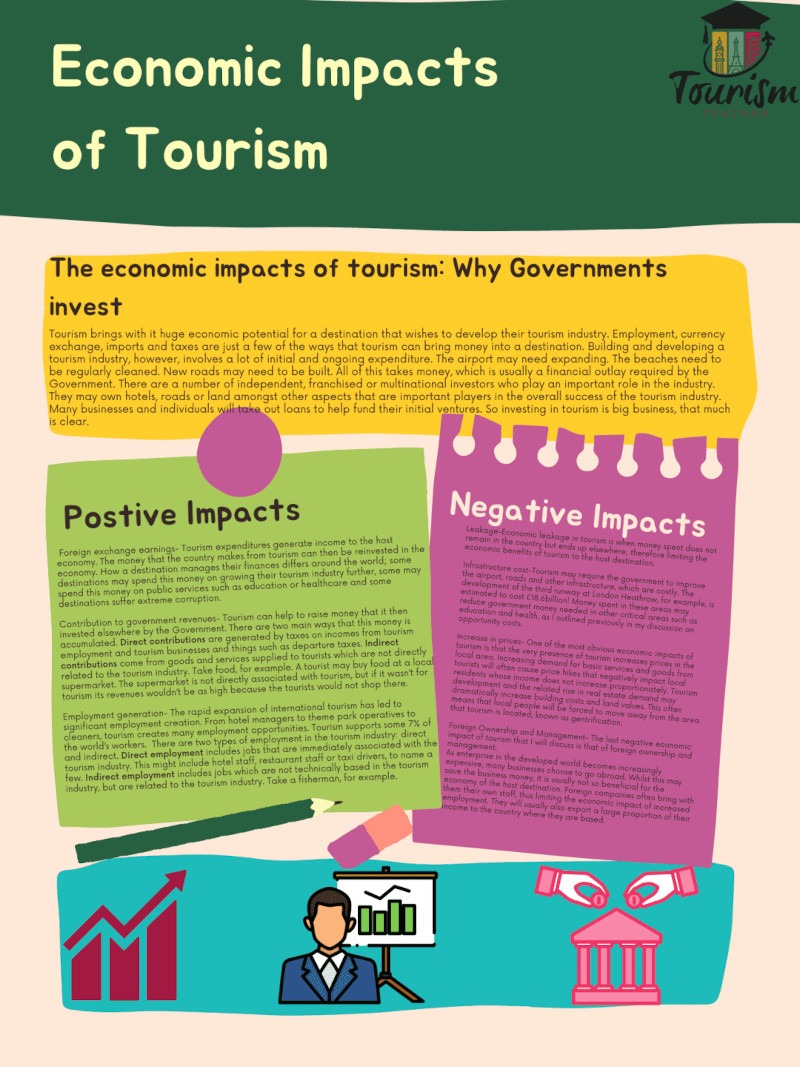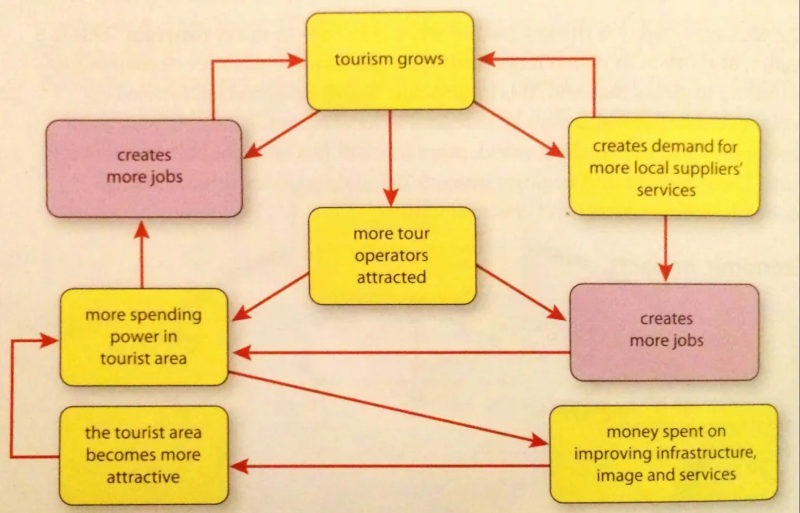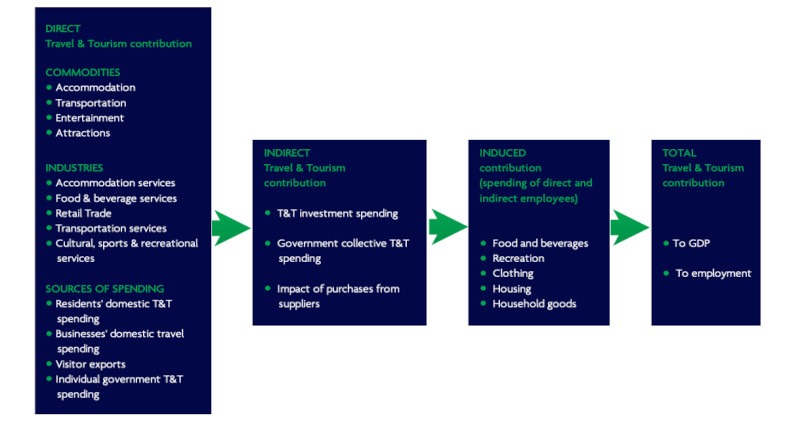
Richard Butler | Exclusive Report by TOURISM TEACHER ECONOMIC IMPACT | 2ND AUGUST, 2024
There are many economic impacts of tourism, and it is important that we understand what they are and how we can maximise the positive economic impacts of tourism and minimise the negative economic impacts of tourism.
Many argue that the tourism industry is the largest industry in the world. While its actual value is difficult to accurately determine, the economic potential of the tourism industry is indisputable. In fact, it is because of the positive economic impacts that most destinations embark on their tourism journey.
There is, however, more than meets the eye in most cases. The positive economic impacts of tourism are often not as significant as anticipated. Furthermore, tourism activity tends to bring with it unwanted and often unexpected negative economic impacts of tourism.
In this article I will discuss the importance of understanding the economic impacts of tourism and what the economic impacts of tourism might be. A range of positive and negative impacts are discussed and case studies are provided.
At the end of the post I have provided some additional reading on the economic impacts of tourism for tourism stakeholders, students and those who are interested in learning more.
The economic impacts of tourism: Why Governments invest
Tourism brings with it huge economic potential for a destination that wishes to develop their tourism industry. Employment, currency exchange, imports and taxes are just a few of the ways that tourism can bring money into a destination.
In recent years, tourism numbers have increased globally at exponential rates, as shown in the World Tourism Organisation data below.
There are a number of reasons for this growth including improvements in technology, increases in disposable income, the growth of budget airlines and consumer desires to travel further, to new destinations and more often.
Here are a few facts about the economic importance of the tourism industry globally:
- The tourism economy represents 5 percent of world GDP
- Tourism contributes to 6-7 percent of total employment
- International tourism ranks fourth (after fuels, chemicals and automotive products) in global exports
- The tourism industry is valued at US$1trillion a year
- Tourism accounts for 30 percent of the world’s exports of commercial services
- Tourism accounts for 6 percent of total exports
- 1.4billion international tourists were recorded in 2018 (UNWTO)
- In over 150 countries, tourism is one of five top export earners
- Tourism is the main source of foreign exchange for one-third of developing countries and one-half of less economically developed countries (LEDCs).
There is a wealth of data about the economic value of tourism worldwide, with lots of handy graphs and charts in the United Nations Economic Impact Report.
In short, tourism is an example of an economic policy pursued by governments because:
- it brings in foreign exchange
- it generates employment
- it creates economic activity
Building and developing a tourism industry, however, involves a lot of initial and ongoing expenditure. The airport may need expanding. The beaches need to be regularly cleaned. New roads may need to be built. All of this takes money, which is usually a financial outlay required by the Government.

For governments, decisions have to be made regarding their expenditure. They must ask questions such as:
How much money should be spent on the provision of social services such as health, education, housing?
How much should be spent on building new tourism facilities or maintaining existing ones?
If financial investment and resources are provided for tourism, the issue of opportunity costs arises.
By opportunity costs, I mean that by spending money on tourism, money will not be spent somewhere else. Think of it like this- we all have a specified amount of money and when it runs out, it runs out. If we decide to buy the new shoes instead of going out for dinner than we might look great, but have nowhere to go…!
In tourism, this means that the money and resources that are used for one purpose may not then be available to be used for other purposes. Some destinations have been known to spend more money on tourism than on providing education or healthcare for the people who live there, for example.
This can be said for other stakeholders of the tourism industry too.
There are a number of independent, franchised or multinational investors who play an important role in the industry. They may own hotels, roads or land amongst other aspects that are important players in the overall success of the tourism industry. Many businesses and individuals will take out loans to help fund their initial ventures.
So investing in tourism is big business, that much is clear. What what are the positive and negative impacts of this?
Positive economic impacts of tourism
So what are the positive economic impacts of tourism? As I explained, most destinations choose to invest their time and money into tourism because of the positive economic impacts that they hope to achieve. There are a range of possible positive economic impacts. I will explain the most common economic benefits of tourism below.
Foreign exchange earnings
One of the biggest benefits of tourism is the ability to make money through foreign exchange earnings.
Tourism expenditures generate income to the host economy. The money that the country makes from tourism can then be reinvested in the economy. How a destination manages their finances differs around the world; some destinations may spend this money on growing their tourism industry further, some may spend this money on public services such as education or healthcare and some destinations suffer extreme corruption so nobody really knows where the money ends up!

Some currencies are worth more than others and so some countries will target tourists from particular areas. I remember when I visited Goa and somebody helped to carry my luggage at the airport. I wanted to give them a small tip and handed them some Rupees only to be told that the young man would prefer a British Pound!
Currencies that are strong are generally the most desirable currencies. This typically includes the British Pound, American, Australian and Singapore Dollar and the Euro.
Tourism is one of the top five export categories for as many as 83% of countries and is a main source of foreign exchange earnings for at least 38% of countries.
Contribution to government revenues
Tourism can help to raise money that it then invested elsewhere by the Government. There are two main ways that this money is accumulated.
Direct contributions are generated by taxes on incomes from tourism employment and tourism businesses and things such as departure taxes.
Taxes differ considerably between destinations. I will never forget the first time that I was asked to pay a departure tax (I had never heard of it before then), because I was on my way home from a six month backpacking trip and I was almost out of money!
Japan is known for its high departure taxes. Here is a video by a travel blogger explaining how it works.
According to the World Tourism Organisation, the direct contribution of Travel & Tourism to GDP in 2018 was $2,750.7billion (3.2% of GDP). This is forecast to rise by 3.6% to $2,849.2billion in 2019.

Indirect contributions come from goods and services supplied to tourists which are not directly related to the tourism industry.
Take food, for example. A tourist may buy food at a local supermarket. The supermarket is not directly associated with tourism, but if it wasn’t for tourism its revenues wouldn’t be as high because the tourists would not shop there.
There is also the income that is generated through induced contributions. This accounts for money spent by the people who are employed in the tourism industry. This might include costs for housing, food, clothing and leisure Activities amongst others. This will all contribute to an increase in economic activity in the area where tourism is being developed.
Employment generation
The rapid expansion of international tourism has led to significant employment creation. From hotel managers to theme park operatives to cleaners, tourism creates many employment opportunities. Tourism supports some 7% of the world’s workers.
There are two types of employment in the tourism industry: direct and indirect.
Direct employment includes jobs that are immediately associated with the tourism industry. This might include hotel staff, restaurant staff or taxi drivers, to name a few.

Indirect employment includes jobs which are not technically based in the tourism industry, but are related to the tourism industry. Take a fisherman, for example. He does not have any contact of dealings with tourists. BUT he does sell his fish to the hotel which serves tourists. So he is indirectly employed by the tourism industry, because without the tourists he would not be supplying the fish to the hotel.
It is because of these indirect relationships, that it is very difficult to accurately measure the economic value of tourism.
It is also difficult to say how many people are employed, directly and indirectly, within the tourism industry.
Furthermore, many informal employments may not be officially accounted for. Think tut tut driver in Cambodia or street seller in The Gambia– these people are not likely to be registered by the state and therefore their earnings are not declared.
It is for this reason that some suggest that the actual economic benefits of tourism may be as high as double that of the recorded figures!
Contribution to local economies
All of the money raised, whether through formal or informal means, has the potential to contribute to the local economy.
If sustainable tourism is demonstrated, money will be directed to areas that will benefit the local community most. There may be pro-poor tourism initiatives (tourism which is intended to help the poor) or volunteer tourism projects.
The government may reinvest money towards public services and money earned by tourism employees will be spent in the local community. This is known as the multiplier effect.
The multiplier effect relates to spending in one place creating economic benefits elsewhere. Tourism can do wonders for a destination in areas that may seem to be completely unrelated to tourism, but which are actually connected somewhere in the economic system.

Let me give you an example.
A tourist buys an omelet and a glass of orange juice for their breakfast in the restaurant of their hotel. This simple transaction actually has a significant multiplier effect. Below I have listed just a few of the effects of the tourist buying this breakfast.
Example 1
The waiter is paid a salary- he spends his salary on schooling for his kids- the school has more money to spend on equipment- the standard of education at the school increases– the kids graduate with better qualifications- as adults, they secure better paying jobs- they can then spend more money in the local community…
Example 2
The restaurant purchases eggs from a local farmer- the farmer uses that money to buy some more chickens– the chicken breeder uses that money to improve the standards of their cages, meaning that the chickens are healthier, live longer and lay more eggs- they can now sell the chickens for a higher price- the increased money made means that they can hire an extra employee– the employee spends his income in the local community…
Example 3
The restaurant purchase the oranges from a local supplier- the supplier uses this money to pay the lorry driver who transports the oranges- the lorry driver pays road tax- the Government uses said road tax income to fix pot holes in the road- the improved roads make journeys quicker for the local community…
So as you can see, that breakfast that the tourist probably gave not another thought to after taking his last mouthful of egg, actually had the potential to have a significant economic impact on the local community!
Development of the Private Sector
The private sector has continuously developed within the tourism industry and owning a business within the private sector can be extremely profitable; making this a positive economic impact of tourism.

Whilst many businesses that you will come across are multinational, internationally-owned organisations (which contribute towards economic leakage).
Many are also owned by the local community. This is the case even more so in recent years due to the rise in the popularity of the sharing economy and the likes of Airbnb and Uber, which encourage the growth of businesses within the local community.
Every destination is different with regards to how they manage the development of the private sector in tourism.
Some destinations do not allow multinational organisations for fear that they will steal business and thus profits away from local people. I have seen this myself in Italy when I was in search of a Starbucks mug for my collection, only to find that Italy has not allowed the company to open up any shops in their country because they are very proud of their individually-owned coffee shops.
Negative economic impacts of tourism
Unfortunately, the tourism industry doesn’t always smell of roses and there are also several negative economic impacts of tourism.
There are many hidden costs to tourism, which can have unfavourable economic effects on the host community.
Whilst such negative impacts are well documented in the tourism literature, many tourists are unaware of the negative effects that their actions may cause. Likewise, many destinations who are inexperienced or uneducated in tourism and economics may not be aware of the problems that can occur if tourism is not management properly.
Below, I will outline the most prominent negative economic impacts of tourism.
Leakage
Economic leakage in tourism is one of the major negative economic impacts of tourism. This is when money spent does not remain in the country but ends up elsewhere; therefore limiting the economic benefits of tourism to the host destination.
The biggest culprits of economic leakage are multinational and internationally-owned corporations, all-inclusive holidays and enclave tourism.
I have written a detailed post on the concept of economic leakage in tourism, you can take a look here- Economic leakage in tourism explained.
Infrastructure cost
Another one of the negative economic impacts of tourism is the cost of infrastructure. Tourism development can cost the local government and local taxpayers a great deal of money.

Tourism may require the government to improve the airport, roads and other infrastructure, which are costly. The development of the third runway at London Heathrow, for example, is estimated to cost £18.6billion!
Money spent in these areas may reduce government money needed in other critical areas such as education and health, as I outlined previously in my discussion on opportunity costs.
Increase in prices
One of the most obvious economic impacts of tourism is that the very presence of tourism increases prices in the local area.
Have you ever tried to buy a can of Coke in the supermarket in your hotel? Or the bar on the beachfront? Walk five minutes down the road and try buying that same can in a local shop- I promise you, in the majority of cases you will see a BIG difference In cost! (For more travel hacks like this subscribe to my newsletter– I send out lots of tips, tricks and coupons!)
Increasing demand for basic services and goods from tourists will often cause price hikes that negatively impact local residents whose income does not increase proportionately.
Tourism development and the related rise in real estate demand may dramatically increase building costs and land values. This often means that local people will be forced to move away from the area that tourism is located, known as gentrification.
Taking measures to ensure that tourism is managed sustainably can help to mitigate this negative economic impact of tourism. Techniques such as employing only local people, limiting the number of all-inclusive hotels and encouraging the purchasing of local products and services can all help.
Economic dependence of the local community on tourism
Another one of the major economic impacts of tourism is dependency. Many countries run the risk of becoming too dependant on tourism. The country sees $ signs and places all of its efforts in tourism. Whilst this can work out well, it is also risky business!

If for some reason tourism begins to lack in a destination, then it is important that the destination has alternative methods of making money. If they don’t, then they run the risk of being in severe financial difficulty if there is a decline in their tourism industry.
In The Gambia, for instance, 30% of the workforce depends directly or indirectly on tourism. In small island developing states, percentages can range from 83% in the Maldives to 21% in the Seychelles and 34% in Jamaica.
There are a number of reasons that tourism could decline in a destination.
The Gambia has experienced this just recently when they had a double hit on their tourism industry. The first hit was due to political instability in the country, which has put many tourists off visiting, and the second was when airline Monarch went bust, as they had a large market share in flights to The Gambia.
Other issues that could result in a decline in tourism includes economic recession, natural disasters and changing tourism patterns. Over-reliance on tourism carries risks to tourism-dependent economies, which can have devastating consequences.
Foreign Ownership and Management
The last of the negative economic impacts of tourism that I will discuss is that of foreign ownership and management.


As enterprise in the developed world becomes increasingly expensive, many businesses choose to go abroad. Whilst this may save the business money, it is usually not so beneficial for the economy of the host destination.
Foreign companies often bring with them their own staff, thus limiting the economic impact of increased employment. They will usually also export a large proportion of their income to the country where they are based. You can read more on this in my post on economic leakage in tourism.
Economic impacts of tourism: Conclusion
As I have demonstrated in this post, tourism is a significant economic driver the world over. However, not all economic impacts of tourism are positive. In order to ensure that the economic impacts of tourism are maximised, careful management of the tourism industry is required.





